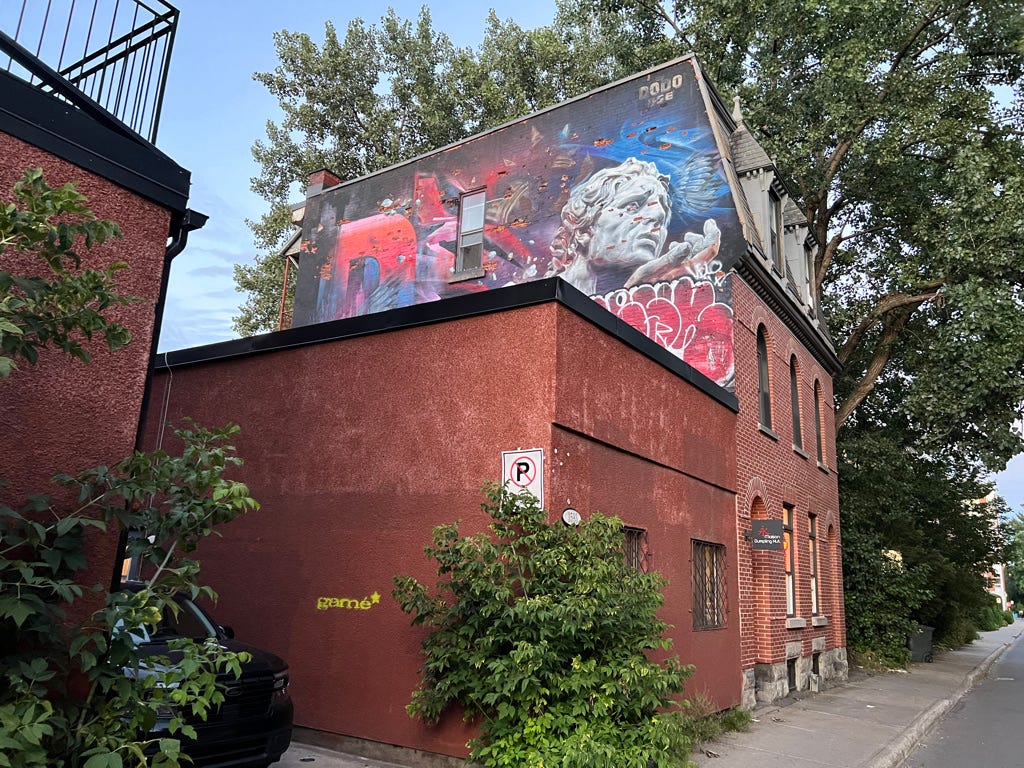Now loss, however cruel, is powerless against possession, which it completes, or even, affirms: loss is, in fact, nothing else than a second acquisition—but now completely interiorized—and just as intense.
~Rainer Maria Rilke
When I first moved to San Francisco when I was just 24 years old, I only knew a few people in the city, and this was the first time I’d ever lived in a city. I was lonely, wonderfully lonely, I think now, and I went out to a cafe nearly every night after work to read and write.
This was the grand era of San Francisco cafes, especially in my neighborhood, the Mission—the Picaro, La Boheme, the Macondo—so to be in a cafe wasn’t to sit in a cafe with people on their devices, as it is now, but to feel the pulse of life happening all around. We all read together, wrote together—and some people sang songs or played cards or hatched revolutionary plans together.
One night, while walking the eight blocks home on Guerrero Street from the Picaro, five teen boys jumped me. They were big, bigger than me. One blindsided me with a punch to the head, and as my knees buckled, another grabbed my backpack—my backpack with my journal in it.
I felt a primal instinct—to protect myself, but it was more than that: someone was taking my journal. It was like a child had been taken from me. I raised my fist in anger, without even thinking that it was me against five others. My instinctual ferocity was forceful enough that the boy who took my bag got scared enough to throw it back to me.
I tell this story to tell the story of how precious a writer’s words can be to them.
I’ve kept a journal since I was seven, and I’ve also kept an infinite number of writerly notebooks filled with ideas and notes for stories, and I’ve only lost two of those in my entire life.
One was in Tucson in 1996. The other was last month. Somehow, after spending weeks sorting through things and things and things in my mom’s house to get everything ready for an estate sale, I forgot it. Or, I think perhaps one of the workers picked up the notebook and put it with the books that were being sold for $1 each.
I’m a saver of words. But to be a saver of words is to also be a loser of words.
So my notebook sold for $1. It was precious to me not just because it was a notebook full of writing like so many others, but because I’d written in it during important times for ideas: the week I was a writer-in-residence at Chautauqua, during my train trip from California to Iowa, and then I’d written down memories and stuffed old letters into the journal as I sifted through things at my mom’s house.
It was an especially dreamy notebook, full of deeper ideas and observations, I thought, because of the conditions I wrote it in. It included breakthroughs of past projects, but more importantly, important thoughts for my next projects since I’ve been in between projects for a while now. The notebook was a pathway out of this interlude I’ve been in.
Is a ‘second acquisition’ possible?
When I was at my mom’s, I discovered drawers full of letters I’d saved. Every letter from my childhood through college. I’ve saved every letter I’ve received since then as well. I’m a saver of words. But to be a saver of words is also to be a loser of words.
I think of the famous story Ernest Hemingway tells in A Moveable Feast. His wife, Hadley, was meeting him on a reporting assignment, in Switzerland, and she thought she’d bring him a surprise from their home in Paris—his stories, including the originals, the carbon copies, and all handwritten notes for a novel in progress.
Right before the train was to depart, Hadley realized the journey would be long and rushed off the train to purchase a bottle of Evian, leaving her bags momentarily unattended. The suitcase was gone when she came back.
There’s nothing more tragic for a writer, of course. Hemingway rewrote those stories, but I wonder how they changed. I wonder if they got better. I like to think so, but there’s also something about the freshness and force of a story’s inception. It’s hard to regain that energy, that momentum.
After I lost my journal, I thought a lot about the driving force of legacy—how somewhere within all writers we seek permanence, or even eternity, in our words, as foolhardy as that might be. We seek to leave our story on this planet, with the idea that someone will care to take the time to read it and think of us.
You might say that writing is a way of asking to be loved that can’t be asked for some reason in real life.
As I sorted through all of the objects in my mom’s house, objects collected and passed down from generations, I thought of the flimsiness of it all. Even the stolid pieces of furniture that had somehow survived since the 1800s. Suddenly, after the sale, it was all gone, after just three days of people scouring the house, never to be seen again.
At a certain point in a writer’s life, you realize you can’t read all of the books you want to read. And then you realize you can’t write all of the stories you want to write. In some ways, to be a writer, you’re always dealing with this sense of loss—so a lost journal shouldn’t matter so much. All of those lost words are just part of an infinite number of lost words. Our words disappear more than they stick.
We lose so much in life. We lose love, memories, jobs and houses, pets and friends. We lose jokes. We lose nights out. We loses touches. We lose big ideas and small ideas.
We’re always left with a continual “second acquisition,” as Rilke mentions in the quote above. But then so much is also a last acquistion.
I now think of whoever bought my notebook full of observations, snippets, dialogue, odd phrases, big ideas. I wonder what they think of it. I wonder if they’ve read it.
It all passes. It’s best to write just for the moment that exists and to relish that moment.
Tell me your story of lost writing
Every writer has a tragic or uplifting or odd story about losing writing. There is solace in sharing these stories, so share yours in the comments below.
Because we need to whine
“I’ve been keeping a diary for 33 years and write in it every morning. Most of it’s just whining, but every so often there’ll be something I can use later: a joke, a description, a quote. It’s an invaluable aid when it comes to winning arguments. ‘That’s not what you said on February 3, 1996,’ I’ll say to someone.”
— David Sedaris
Because we need to recreate ourselves
“In the journal I do not just express myself more openly than I could to any person; I create myself.”
— Susan Sontag
Because an experience needs to be re-experienced
“These handwritten words in the pages of my journal confirm that from an early age I have experienced each encounter in my life twice: once in the world, and once again on the page.”
— Terry Tempest Williams
Because we need to remember and we need to forget
“To write a diary is to make a series of choices about what to omit, what to forget. A memorable sandwich, an unmemorable flight of stairs. A memorable bit of conversation surrounded by chatter that no one records.”
―Sarah Manguso
Because we need to be kept
“Keep a diary and one day it’ll keep you.”
— Mae West
I have open story coaching/editing spots!
I love working with writers, and I have some space on my Writing Consult calendar if anyone's looking!
Basically, I can take different approaches based on your needs: I can work with you like a manuscript therapist, with as many hourly sessions as desired. Lately, I've worked on a few novels as well as some short story projects. I’ve also worked on helping people figure out what kind of writer they are or want to be, and which projects can help get them there.
I help people develop books and projects from scratch and sometimes do larger edits on finished manuscripts.
I’ve written extensively about creativity in numerous books and articles, talked with 300+ writers on my podcast, Write-minded, founded 100 Word Story, and …. well, I’ve just immersed myself in all things writing for a lifetime, and I love, love, love working with writers to tell their stories.
Contact me to find out more about my one-on-one work with writers.
Because a photo
I went to Montreal!







I especially liked this line: "You might say that writing is a way of asking to be loved that can’t be asked for some reason in real life."
As a memoirist, that felt like Truth to me. I shared it with writer friends this morning, and they agreed. Quite profound, my friend.
I can't love this post as it broke my heart so. I'm so sorry for your loss. I loved the parts of that journey you shared with us on the train. It made me want to do the trip. Sometime, in the middle of June, I lost all my notes in back up of my books I'm working on. My husband and computer nerd has been traveling and busy so I carried on like a dutiful soldier but here I am in September afraid so go back through my back ups and find all of it won't be there so I'm not looking. I keep telling him "tomorrow." "Let's do it, tomorrow." He says he's available this morning so I think tomorrow arrived just now. Wish me luck. Speaking of luck...lucky shopper who picked up your notebook for a buck. heart here. smiley too